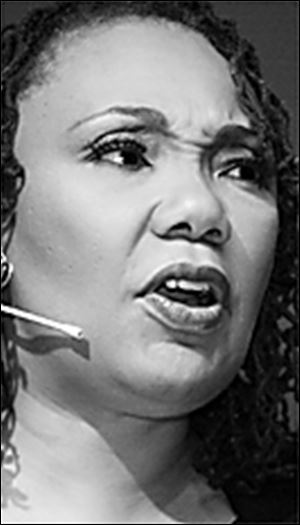
Yolanda King's father was her buddy
1/28/2005
King
BOWLING GREEN - Yolanda King has traveled the country talking about her father's legacy, but said last night no one ever asked her the question of reconciling Martin Luther King, Jr. the civil rights leader to Martin Luther King, Jr. the father.
When that question came during a question-and-answer session last night following a speech and presentation at Bowling Green State University's Bowen-Thompson Student Union, it gave her pause.
Ms. King, the eldest daughter of the slain civil rights leader and Coretta Scott King, spoke to a room of about 1,000 people as part of the university's Martin Luther King, Jr. Legacy Celebration.
She said her memories of her father were just that - as her father.
"I was 12 years old when he died," Ms. King said. "He was a buddy daddy. He was my first friend. He would romp with us around the house, and it drove mama crazy. I had to learn about Martin Luther King, Jr, the hero, civil rights activist, and philosopher pretty much like everyone else, by reading about it."
Ms. King said she did pretty much that over the years, reading just about everything she could get her hands on about her father and his legacy.
She seemed to have mastered her father's work, shown by her 45-minute multimedia presentation that included poetry, acting, and her own thoughts on the civil rights movement to which her father gave definition.
Ms. King, the founder of Higher Grounds Productions, said technology has helped bring the world closer together with the Internet and personal computers. She said, though, the technology hasn't helped build relationships across racial, cultural, and religious barriers.
"We still haven't learned the simple art of living together as brother and sister," Ms. King said. "We are all amazing, interesting, and beautiful. But if we're all so amazing, interesting, and beautiful, why can't we still live with one another?"
Her mixture of poetry, play performances she created about the civil rights movement, and her own insights about diversity and unity today kept the audience on the edge of their seats.
In part of her presentation, she gave a dramatic performance of children resisting the water hoses and police dogs in Birmingham, mixed with sounds of barking canines and crowd noise in the background that mentally took the audience back in time.
Ms. King, who was paid $17,000 for the presentation, challenged her audience to take up the cause of nonviolent social change, telling them they have ability of choice to participate in making the world better, standing on the sideline, or being caught in the middle.
"You know what happens to those who are caught in the middle of the road," she said. "They're run over."
Ms. King said her father's last effort was to bring poor people of all racial backgrounds together for economic justice. She said Mr. King felt the economic conditions in the late 1960s affected people of all races, and unifying the poor under that cause could make great impact.
In response to another question, Ms. King said she believed her father would have been against U.S. forces in Iraq, especially in view of the resources the war has taken away.
"He would have called on us to take a good hard look at the war," Ms. King said.